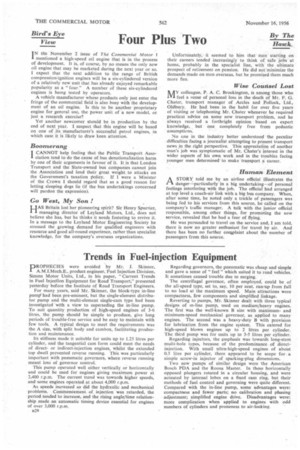Four Plus Two
Page 62

If you've noticed an error in this article please click here to report it so we can fix it.
Bird's Eye View By The Hawk
I N ttie November 2 issue of The Commercial Motor I mentioned a high-speed oil engine that is in the process of development. It is, of course, by no means the only new oil engine that may he marketed during the next year or so. I expect that the next addition to the range of British compression-ignition engines will be a six-cylindered version of a relatively new unit that has already enjoyed remarkable popularity as a "four." A number of these six-cylindered engines is being tested by operators.
A vehicle manufacturer whose products only just enter the fringe of the commercial field is also busy with the development of an oil engine. Is this to be another proprietary engine for general use, the power unit of a new model, or just a research exercise?
Yet another newcomer should be in production by the end of next year. I suspect that this engine will be based on one of its manufacturer's successful petrol engines, in which case it is likely to draw keen attention.
Boomerang
I CANNOT help feeling that the Public Transpoit Asso
ciation tend to do the cause of bus denationalization harm by one of their arguments in favour of it. It is that London Transport and the State-owned bus companies cannot join the Association and lend their great weight to attacks on the Government's taxation policy. If I were a Minister of the Crown I should regard that as a good reason for letting sleeping dogs lie (if the bus undertakings concerned will pardon the expression).
Go West, My Son !
HAS Britain lost her pioneering spirit? Sir Henry Spurrier, managing director of Leyland Motors, Ltd., does not believe she has, but he thinks it needs fostering to revive it. In a message to the Leyland Motor Engineering Society he stressed the growing demand for qualified engineers with resource and good all-round experience, rather than specialist knowledge, for the company's overseas organizations.
Unfortunately, it seemed to him that men starting on their careers tended increasingly to think of safe jobs at hornc, probably in the specialist line, with the ultimate prospect of retirement on pension. He did not minimize the demands made on men overseas, but he promised them much more fun.
Wise Counsel Lost
A Y colleague, P. A. C. Brockington, is among those who IVJ feel a sense of personal loss in the death of Mr. F. G. Chater, transport manager of Accles and Pollock, Ltd., Oldbury. He had been in the habit for over five years of visiting or telephoning Mr. Chatcr whenever he required practical advice on some new transport problem, and he always received a forthright opinion based on expert knowledge, but one completely free from pedantic assumptions.
No one in the industry better understood the peculiar difficulties facing a journalist attempting to present transport news in the right perspective. This appreciation of another man's job was symptomatic of Mr. Chater's interest in the wider aspects of his own work and in the troubles facing younger men determined to make transport a career.
Human Element
A STORY told me by an airline official illustrates the danger--particularly in a big undertaking—of personal feelings interfering with the job. The official had arranged at top level a coach-air link with a big bus company. When, after some time, he noted only a trickle of passengers WAS being fed to his services from this source, he called on the company's traffic manager. A talk with the junior official responsible, among other things, for promoting the new service, revealed that he had a fear of flying.
He was persuaded to travel on the service and, I am told, there is now no greater enthusiast for travel by air. And there has been no further conaplaint about the number of passengers from this source.




















































































































